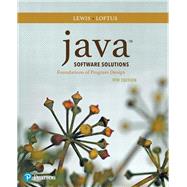NOTE: Before purchasing, check with your instructor to ensure you select the correct ISBN. Several versions of Pearson's MyLab & Mastering products exist for each title, and registrations are not transferable. To register for and use Pearson's MyLab & Mastering products, you may also need a Course ID, which your instructor will provide.
Used books, rentals, and purchases made outside of Pearson
If purchasing or renting from companies other than Pearson, the access codes for Pearson's MyLab & Mastering products may not be included, may be incorrect, or may be previously redeemed. Check with the seller before completing your purchase.
For courses in Java programming
This package includes MyLab™ Programming.
Empowers students to write useful, object-oriented programs
Java Software Solutions establishes a strong foundation of programming techniques to foster well-designed object-oriented software. Heralded for its integration of small and large real-world examples, the worldwide best-selling text emphasizes problem-solving and design skills and introduces students to the process of constructing high-quality software systems. The 9th Edition features a sweeping overhaul of Graphics Track coverage, to fully embrace the JavaFX API. This fresh approach enriches programmers’ understandings of core object-oriented principles. The text uses a natural progression of concepts, focusing on the use of objects before teaching how to write them—equipping students with the knowledge and skill they need to design true object-oriented solutions.
Personalize learning with MyLab Programming.
MyLab Programming is an online learning system designed to engage students and improve results. MyProgrammingLab consists of programming exercises correlated to the concepts and objectives in this book. Through practice exercises and immediate, personalized feedback, MyProgrammingLab improves the programming competence of beginning students who often struggle with the basic concepts of programming languages.
0133796280 / 9780133796285 Java Software Solutions plus MyProgrammingLab with Pearson eText -- Access Card Package
Package consists of:
- 0133594955 / 9780133594959 Java Software Solutions
- 0133781283 / 9780133781281 MyProgrammingLab with Pearson eText -- Access Code Card -- for Java Software Solutions: Foundations of Program Design








